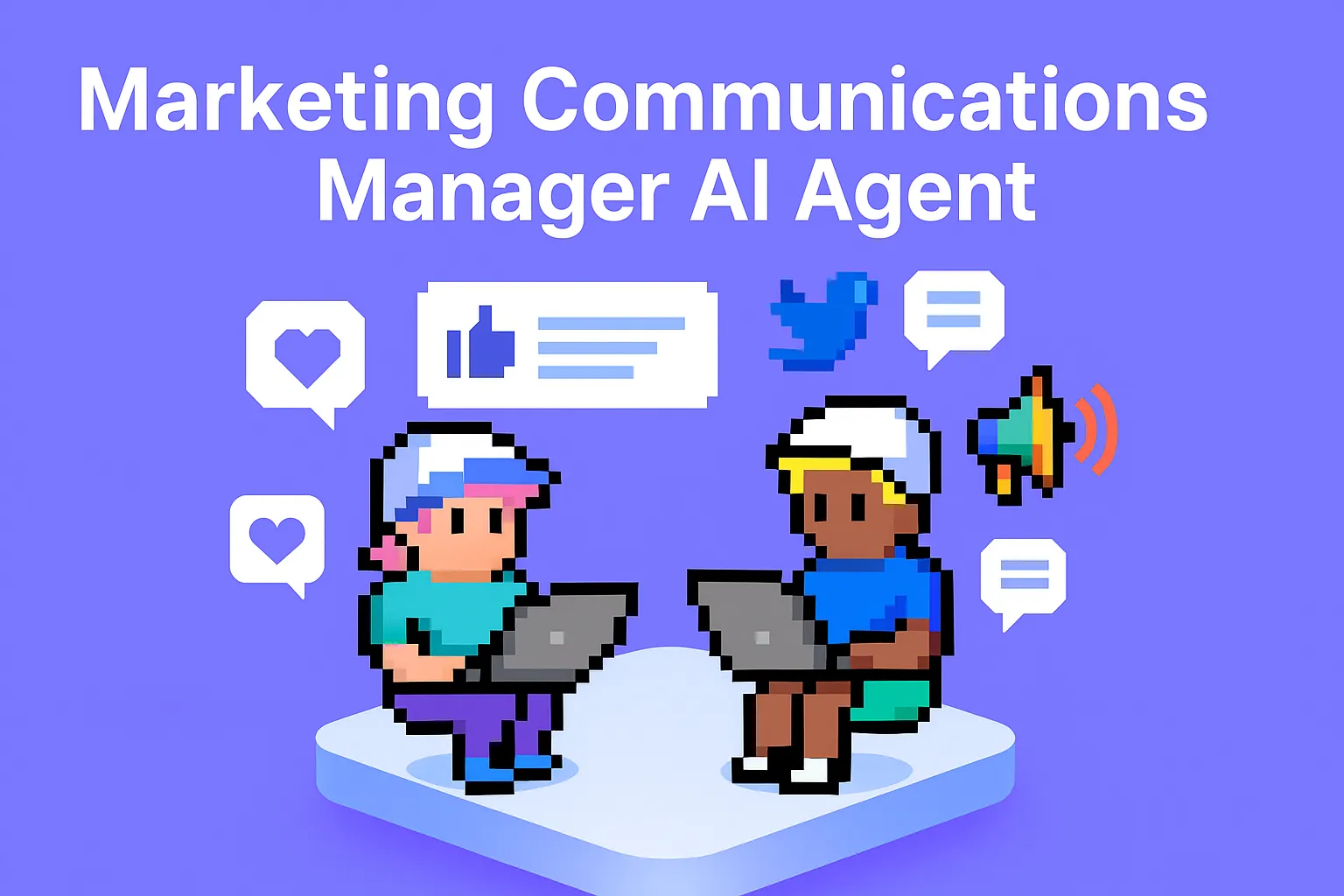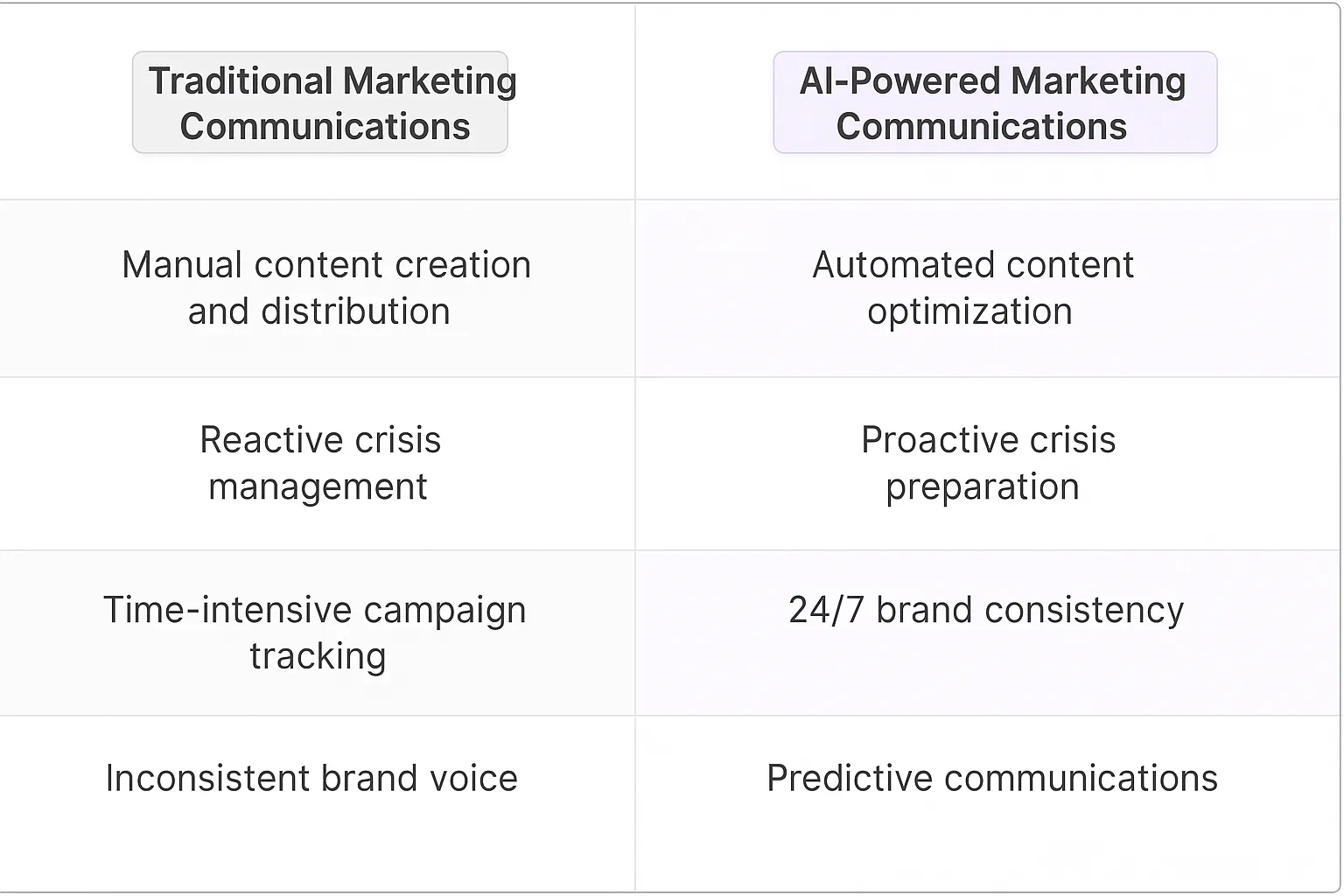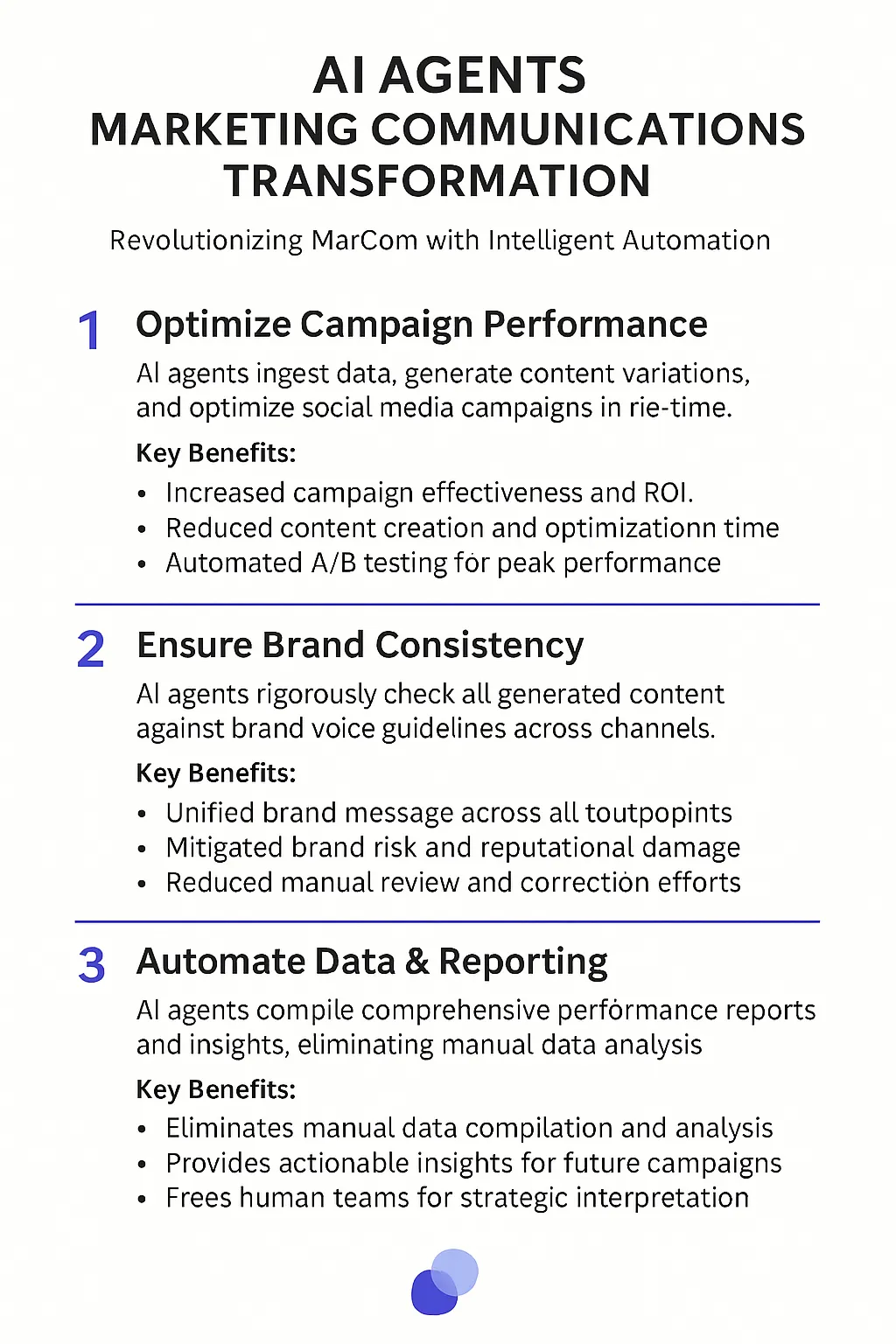Marketing Communications Manager represents a new breed of AI-powered technology that serves as a strategic partner in brand communications. Unlike basic automation tools, it brings sophisticated capabilities in content creation, campaign orchestration, and brand voice management. The system analyzes vast amounts of data to make real-time decisions about messaging, timing, and channel selection while maintaining brand consistency.
The core capabilities include real-time content optimization based on performance data, multi-channel campaign coordination, brand voice consistency monitoring, and predictive crisis communications. The system excels at identifying patterns across channels, transforming raw metrics into actionable insights, and maintaining 24/7 brand presence. Most notably, it demonstrates continuous learning - each interaction improves its understanding of your brand's unique communication needs.

Marketing Communications Managers traditionally juggled multiple tools and manual processes to get their work done. They'd spend hours in spreadsheets tracking campaign metrics, wrestling with content calendars, and coordinating with various team members through endless email chains. The typical stack included Google Analytics, social media management tools, email marketing platforms, and project management software - all operating in silos.
The introduction of AI Agents fundamentally shifts how MarCom managers operate. These digital teammates function as force multipliers, handling complex tasks that previously required multiple human touchpoints.
Content creation and optimization become significantly more efficient. AI Agents can analyze past campaign performance data and suggest messaging adjustments in real-time. They'll flag potential issues in brand consistency across channels and propose improvements based on historical engagement patterns.
The real game-changer is in campaign coordination. AI Agents can simultaneously monitor social media sentiment, track PR mentions, and adjust email campaign timing - all while maintaining a coherent brand voice. They're essentially operating as a 24/7 brand guardian, catching inconsistencies and opportunities that humans might miss.
For data analysis, AI Agents transform raw metrics into actionable insights without requiring manual processing. They can identify emerging trends across channels and automatically generate performance reports that highlight meaningful patterns rather than just numbers.
The most compelling benefit is how AI Agents handle crisis communication preparation. They continuously monitor brand mentions and market signals, preparing draft responses for various scenarios before issues escalate. This proactive approach gives MarCom managers more strategic control over brand narrative.
What's particularly fascinating is how AI Agents learn from each interaction, gradually building a deep understanding of your brand voice and communication patterns. This creates a compounding effect where their assistance becomes increasingly valuable over time.

The marketing communications landscape operates on a loop of creation, distribution, and optimization. Digital teammates can transform this loop by operating in the background 24/7, continuously learning from performance data and audience responses.
What's particularly powerful is the ability to maintain consistent brand voice across hundreds of touch points while adapting tone and style for different channels and audiences. This isn't just about automation - it's about scaling human judgment and creativity.
The most successful MarCom teams are already using AI agents to handle the heavy lifting of content creation and distribution, freeing up human strategists to focus on high-level creative direction and relationship building. This creates a multiplier effect where each team member can effectively manage 5-10x more communications initiatives.
The next frontier is predictive communications, where AI agents can anticipate potential crises or opportunities and prepare response frameworks before they're needed. This shifts MarCom from reactive to proactive, fundamentally changing how brands manage their public presence.
Integration with email marketing platforms enables sophisticated audience segmentation and personalized messaging at scale.

The versatility of AI agents in Marketing Communications makes them game-changing partners for MarCom teams across multiple sectors. Drawing from my experience working with growth teams and marketing organizations, I've observed specific patterns where AI creates the most impact. Let me break down the concrete ways different industries are leveraging these digital teammates to transform their marketing communications.
What's fascinating is how AI agents adapt to industry-specific challenges - from helping healthcare providers craft sensitive patient communications to enabling tech companies scale their product marketing across global markets. The key differentiator isn't just automation - it's the ability to maintain brand voice while handling complex marketing tasks that traditionally required extensive human oversight.
Through my work with startups and enterprise companies, I've noticed that the most successful implementations happen when teams view AI agents as specialized marketing partners rather than generic tools. They're particularly effective when integrated into existing marketing workflows where they can learn from historical content creation and brand guidelines while bringing fresh perspectives to communications challenges.
The sophistication of modern AI agents in handling campaign coordination allows marketing teams to orchestrate complex multi-channel initiatives with unprecedented precision and consistency.
A national retail chain deployed a Marketing Communications Manager AI Agent to orchestrate their seasonal campaign launches across 500+ stores. The digital teammate analyzes historical campaign performance data, customer segment behaviors, and real-time market trends to craft tailored messaging strategies.
When the brand launched their summer collection, the AI agent identified micro-trends within specific geographic regions and adjusted promotional messaging accordingly. For stores in the Southwest, it emphasized moisture-wicking fabrics and breathable materials, while coastal locations received content focused on beach-ready styles and UV protection.
The agent's ability to process vast amounts of customer feedback across social channels, email responses, and in-store surveys allowed it to rapidly iterate messaging. Within the first week of the campaign, it detected that Instagram posts featuring lifestyle shots with products in natural settings generated 3.2x more engagement than studio photos. The agent automatically adjusted the content calendar to prioritize this style of imagery.
Most impressively, the AI managed to maintain brand voice consistency while personalizing messages for different channels. Email marketing communications struck a professional yet approachable tone, while social media management content adopted a more casual, conversational style that resonated with younger audiences.
The results spoke volumes: The summer campaign saw a 47% increase in engagement rates compared to previous seasons, with a 28% boost in conversion rates from social media traffic. The marketing team was able to focus on high-level strategy and creative direction, while the AI handled the complex orchestration of day-to-day communications across channels.
This retail case demonstrates how Marketing Communications Manager AI Agents can transform campaign execution from a linear, one-size-fits-all approach to a dynamic, data-driven system that adapts in real-time to customer responses and market conditions.
I recently observed a fascinating case at a Series B SaaS startup that implemented a Marketing Communications Manager AI Agent to handle their rapid expansion into new markets. The company was hitting an inflection point - growing from 10,000 to 100,000 users in just 18 months - and their lean marketing team was stretched thin.
The AI agent took ownership of their content distribution and engagement tracking across product launch announcements, user onboarding sequences, and developer community updates. What caught my attention was how it parsed user interaction patterns from their product analytics, GitHub discussions, and social channels to identify which technical concepts needed more explanation.
When the startup released a major API update, the agent analyzed thousands of developer forum posts and support tickets to identify common implementation challenges. It then automatically generated targeted documentation, code examples, and tutorial content, distributing them through relevant channels. The agent even adjusted the technical depth of communications based on each developer's prior engagement history.
The sophistication of the AI's audience segmentation was remarkable. It created distinct communication tracks for enterprise architects, indie developers, and technical founders - each with its own technical depth and business context. The messaging evolution showed clear signs of compounding learning effects: each wave of content performed better than the last as the AI refined its understanding of audience preferences.
The metrics validated this approach: developer documentation engagement increased by 156%, time-to-implementation for new API features dropped by 43%, and most importantly, the viral coefficient for new user acquisition improved from 0.9 to 1.4. The marketing team shifted from spending hours on content distribution to focusing on product storytelling and community building.
This case exemplifies the network effects possible when AI agents handle the complex orchestration of technical marketing communications, allowing human teams to focus on strategy and relationships. It's a pattern I'm seeing repeatedly in high-growth tech companies.
Marketing Communications Manager AI agents require sophisticated integration with multiple data sources and marketing platforms. The agent needs access to customer data, campaign metrics, content management systems, and social media APIs. Getting these connections right while maintaining data security is complex. Many organizations struggle with data silos and legacy systems that don't play well with new AI tools.
While AI agents can draft marketing communications quickly, maintaining consistent brand voice and quality requires careful oversight. The agent may miss subtle cultural nuances or produce content that feels mechanical. Organizations need robust review processes and clear brand guidelines that the agent can learn from over time.
Marketing teams often resist AI adoption, fearing job displacement. The key is positioning the AI agent as a digital teammate that handles repetitive tasks, freeing humans to focus on strategy and creativity. Teams need training on how to effectively collaborate with and guide the AI agent.
Beyond the initial implementation costs, organizations must factor in ongoing expenses like API calls, model training, and human oversight. The ROI timeline varies based on team size and communication volume. Small teams may find the investment hard to justify initially.
Tracking the AI agent's impact requires new metrics beyond traditional marketing KPIs. Teams need to measure factors like time saved, content consistency, response times, and error rates. Building these measurement systems takes time and iteration.
Advanced data analysis capabilities are essential for understanding AI agent effectiveness and optimizing performance measurement across different marketing channels.
Marketing communications require transparency about AI involvement. Organizations must develop clear policies about disclosure, data usage, and appropriate AI application. The agent needs guardrails to prevent misleading or inappropriate communications.
The integration of AI Agents into marketing communications marks a pivotal shift in how brands manage their public presence. The technology's ability to handle complex communications tasks while learning and adapting creates unprecedented scalability for marketing teams. Forward-thinking organizations are already leveraging these digital teammates to transform their operations from reactive to proactive, setting new standards for brand communications in the digital age.
The evolution of marketing communications through AI integration enables sophisticated brand communications strategies that maintain consistency while scaling across multiple channels and touchpoints.
The key to success lies not in replacing human creativity but in amplifying it - creating a symbiotic relationship between human strategists and AI capabilities that drives superior marketing outcomes.